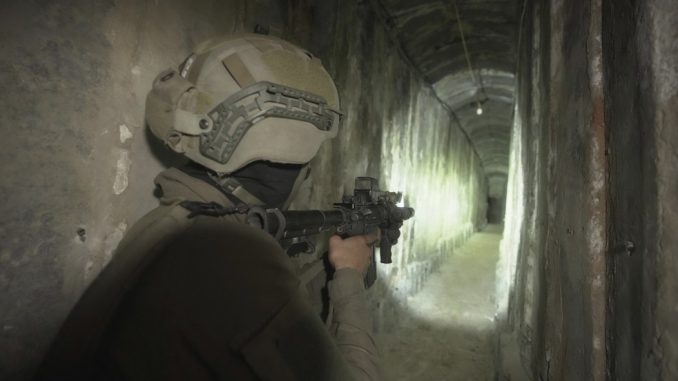
AP Photo/Victor R. Caivano
Published November 9, 2025
While headlines often focus on missile barrages, political posturing, and cease-fire negotiations, a less visible but highly consequential chapter of the Israel-Gaza conflict is unfolding underground — literally. Deep beneath Gaza’s streets, at least 200 militants are trapped in a network of tunnels, and the question of their fate is now sparking intense diplomatic debate.
The Underground Predicament
These fighters, primarily Hamas operatives, are stranded in tunnels located in areas now under Israeli control, notably around Rafah and other southern Gaza zones. These tunnels were initially designed as transportation and smuggling routes, but they have increasingly become fortified underground bunkers.
The militants reportedly became trapped when Israeli forces advanced under a ceasefire framework that established control zones. Communication with these fighters was lost months ago, leaving them isolated in claustrophobic, dangerous conditions. Some estimates suggest as many as 300 fighters are affected.
“Hamas has lost the ability to communicate with these men for months,” sources say, highlighting both the operational and human complexity of the situation.
Strategic Stakes for Israel
For Israel, the trapped militants present both an opportunity and a dilemma:
-
Tactical Advantage – The IDF can potentially capture or neutralize these militants without direct confrontation in open urban areas.
-
Symbolic Victory – Successfully securing the tunnels would reinforce Israel’s narrative of maintaining operational superiority over Hamas.
-
High-Risk Operations – Any attempt to forcibly remove the militants could trigger booby traps, tunnel collapses, or retaliatory attacks from aboveground Hamas fighters.
Who Wants Them Freed?
Unexpectedly, multiple international actors are pressing Israel to consider safe passage for these militants. Delegations from the United States, Turkey, and Qatar have proposed schemes in which the fighters surrender their weapons to a neutral party before returning to Hamas-controlled territory.
The rationale behind this approach is diplomatic and strategic:
-
It could avert further bloodshed underground.
-
It might advance broader cease-fire negotiations and demilitarization agreements.
-
It allows regional actors to position themselves as mediators, preserving their influence in Gaza.
Israel Pushback
Despite these diplomatic overtures, Israel’s stance is firm, particularly among key government figures:
-
Prime Minister Netanyahu has denied any consideration of releasing the militants, citing national security risks.
-
IDF Leadership stresses that any release must be contingent on the recovery of soldiers’ remains, such as that of Hadar Goldin, whose body is believed to be in the same tunnel complex.
-
Internal Debate remains heated, as some voices argue for strictly military solutions, while others recognize the diplomatic pressure from international partners.
Ethical and Humanitarian Considerations
The tunnels are more than just a military concern; they raise moral questions as well:
-
Survival of Militants – With food, water, and communication severely limited, their survival is uncertain.
-
Civilian Risk – Tunnels are often embedded under civilian areas, complicating any extraction or attack.
-
Soldiers’ Remains – The tunnels may hold remains of Israeli soldiers, intensifying ethical stakes and public pressure on the government.
Israel will not allow Hamas fighters trapped beneath occupied areas of Gaza to exit safely.
Israeli Prime Minister Benjamin Netanyahu’s office denied reports that Hamas terrorists would be allowed to exit if they give up their guns.
Israel currently controls a little more than half of the Gaza Strip, with Hamas claiming it cannot contact its cells stuck in the occupied areas.
 Implications
Implications
of the situation with the trapped militants:
-
Military & Tactical Implications – The presence of militants trapped in tunnels gives Israel a tactical advantage, but any operation to extract or neutralize them carries risks, including potential casualties and escalation.
-
Political Implications – Allowing or refusing safe passage could affect domestic politics in Israel, influencing public opinion and support for the government.
-
Diplomatic Implications – Pressure from mediators like the U.S., Qatar, and Turkey highlights the international stakes. How Israel responds could impact its diplomatic relationships and future negotiations with Hamas or regional actors.
-
Security Implications – If militants are freed or escape, there is a high risk of renewed attacks, impacting civilian safety and regional stability.
-
Moral & Ethical Implications – Decisions are tied to the recovery of soldiers’ remains and the treatment of trapped militants, raising ethical questions about wartime conduct, humanitarian obligations, and deterrence.
 Overall Takeaway:
Overall Takeaway:
The fate of the militants trapped in Gaza’s tunnels is more than a tactical question — it is a test of Israel’s military strategy, diplomatic resolve, and ethical boundaries. Every decision, whether to release, capture, or neutralize them, carries consequences that could ripple across the region. As mediators press for negotiation and Israel weighs security against diplomacy, the world watches a high-stakes dilemma unfold beneath the surface — a stark reminder that in war, the battles above ground are often mirrored by conflicts hidden underground.
SOURCES: REDSTATE – At Least 200 Terrorists Are Trapped in Tunnels Behind Israeli Lines and Guess Who Wants to Free Them?
THE NEW YORK POST – Netanyahu will not allow ‘safe passage’ for 200 Hamas terrorists trapped in Gaza tunnels
FINANCIAL TIMES – US presses Israel to let Hamas fighters leave Gaza tunnels








Be the first to comment